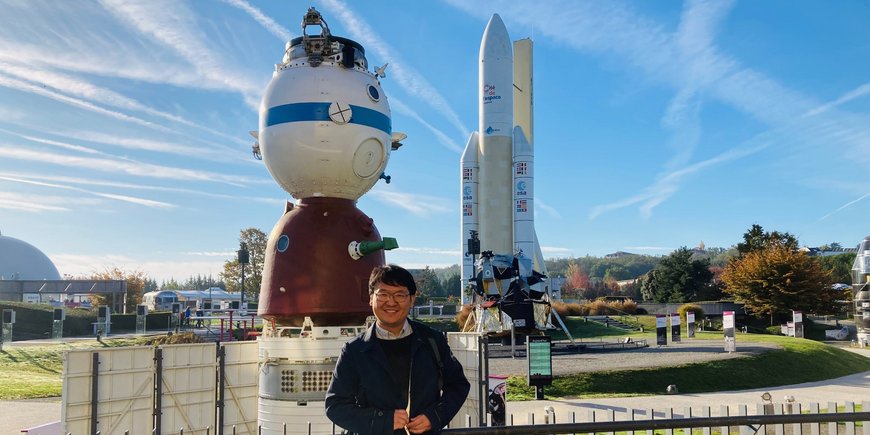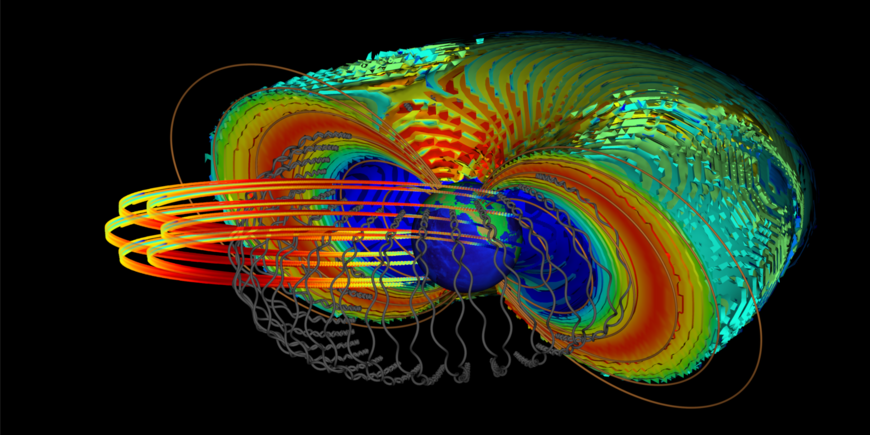Dr Dedong Wang, Deputy Head of Section 2.7 “Space Physics and Space Weather” and Head of the “Wave-Particle Interactions and their Effects” working group at the GFZ German Research Centre for Geosciences, has been awarded a prestigious ERC Consolidator Grant. This means that his “WIRE” project will be funded with ~2 million Euros for a period of five years from mid-2024. With the Consolidator Grants, the European Research Council supports excellent, promising scientists whose research group is in the consolidation phase – seven to twelve years after completing their doctorate.
The WIRE project: Interaction processes in the radiation belts around the Earth
Wang will investigate phenomena that take place in the radiation belts that surround our Earth at a distance of several to tens of thousands of kilometres. Ultra-fast electrons – they can reach up to 99.9 percent of the speed of light – originating from the sun, orbit here. The Earth is largely protected from the dangerous effects of solar particle streams by its magnetic field. However, some electrons can penetrate the protective shielding and then will be accelerated to high energies by the magnetic field vibrations. The high-energy electrons are dangerous for satellites orbiting the Earth and can be a threat for astronauts in space. Numerous space systems important to modern society operate in this region.
“The overarching question we are investigating with our project is: Why do the Earth’s radiation belts respond differently to geomagnetic storms which have approximately the same intensity?” explains Dedong Wang. Geomagnetic storms are disturbances of the Earth's magnetic field caused by solar activity. To answer this question, Wang and his team will analyse the complex interactions in the radiation belt. In this dynamic mixture of various charged particles, also known as plasma, and the resulting electromagnetic fields, he is particularly interested in the effect that so-called plasma waves have on the particles.
For his investigations, he will combine state-of-the-art measurements from several satellites, various modelling techniques and machine learning.
“The knowledge gained in this project can be useful not only for the protection of space systems, but also for the fundamentals of plasma physics and astrophysics, as similar fundamental processes take place everywhere in the universe,” explains Wang.
Brandenburg's Research Minister Manja Schüle congratulates:
“Research that inspires far beyond Brandenburg: The European Research Council has awarded astrophysicist Dr Dedong Wang from the GFZ German Research Centre for Geosciences one of the prestigious and coveted ERC Consolidator Grants – congratulations! With his WIRE project, the GFZ top researcher will now investigate why the Earth's radiation belts react differently to geomagnetic storms of the same intensity – good for the protection of satellites. Once again it is clear that research into the future is being carried out in Brandenburg – and is excellent!”
The Scientific Director of the GFZ, Susanne Buiter, is also delighted with the success:
“This is an outstanding success for Dedong Wang, whom I warmly congratulate. I am delighted for him personally and for the GFZ. Dedong Wang can expand his team and deepen his already very successful research on complex phenomena in near-Earth space. This further ERC grant for the GFZ comes in line with our current focus topic ‘Space Weather and Geomagnetism’, which we will highlight in the first months of 2024. The research funding at European level emphasises how relevant the developments and phenomena in near-Earth space are for us on Earth and for geoscience research.”
The “WIRE” research project in detail
The electron flows in the radiation belts around the Earth are very dynamic and have not yet been fully understood. The reason for this is a delicate balance between various particle acceleration and loss processes. It is assumed that their interactions with various types of so-called plasma waves play a decisive role in the acceleration and loss of the fast electrons. Plasma is the term used to describe the mixture of various charged particles.
In order to quantify the effects of different types of plasma waves on the dynamics of radiation belt electrons, comprehensive wave models are required. They are to be developed within the WIRE project by combining state-of-the-art measurements from several satellites, empirical modelling, machine learning and physics-based modelling.
Satellites provide important data for the development of wave models. The parameters of the wave model are fed into state-of-the-art codes to simulate the dynamics of the radiation belt. Finally, the simulation results are validated using satellite particle observations.
About the person
Dedong Wang has been conducting research at the GFZ in Section 2.7 “Space Physics and Space Weather” since 2017 and has regularly lectured at the University of Potsdam since then. Since 2022, he has been deputy section head and head of the working group “Wave-Particle Interactions and their Effects”. In 2023 he was elected to the Internal Scientific Council of the GFZ.
Wang studied at Wuhan University in China, where he received his doctorate in space physics in 2014 and held a post-doctoral position until 2016. He has already received numerous awards for his research. In 2019, he received the GFZ Prize for Young Scientists. In 2020, he was honoured with the Young Scientist Award URSI GASS of the International Union of Radio Science and a poster prize. He has already received several prizes for the best scientific publication and was awarded various scholarships during his studies and doctorate.











![[Translate to English:] Torsten Sachs in front of a climate station on a field](/fileadmin/_processed_/3/9/csm__TorstenSachs_bearbeitet_GS_4a1365ef84.jpeg)

![[Translate to English:] left image flood at the Ahrtal: image from above, several houses are flooded; left image:: Heidi Kreibich;](/fileadmin/_processed_/4/4/csm_Bild2_9af0130e9f.png)



![[Translate to English:] Start der Vega Rakete](/fileadmin/_processed_/6/4/csm_20231201-kachel_Vega-VV23-launch_ESA-CNES-Arianespace_706716b68c.jpeg)









![[Translate to English:] Poster exhibition at the Brandenburg Hydrogen Day at the GFZ, some participants in the foreground](/fileadmin/_processed_/6/5/csm_Erster_Brandenburgischer_Wasserstofftag_GFZ_402fcec95e.jpeg)
![[Translate to English:] Group picture of the participants](/fileadmin/_processed_/9/4/csm_20231108_CAWa-Workshop-Tashkent_Gruppenbild_99ea779d8a.jpeg)

![[Translate to English:] [Translate to English:] Hörsaal](/fileadmin/_processed_/e/6/csm_H%C3%B6rsal_e21ac645fb.jpeg)


![[Translate to English:] The Delegations in the Historic Library on the Telegrafenberg. In the back there are from left to right, the Dutch Ambassador for Germany, Ronald van Roeden, the Dutch Minister for Education, Culture and Science, Robbert Dijkgraaf and the scientific director of the GFZ, Susanne Buiter.](/fileadmin/_processed_/d/b/csm_Kachel-2_9eba4b4212.jpeg)

